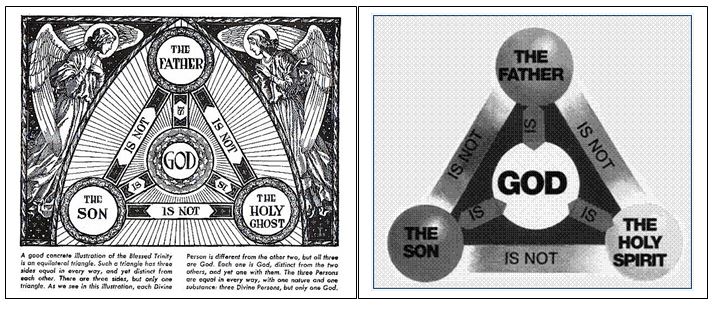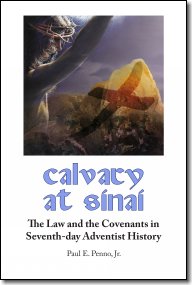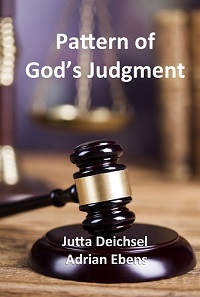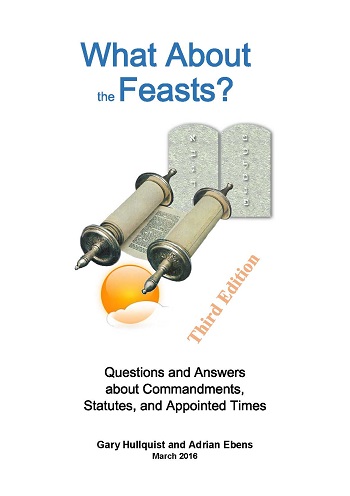27. Assumed as a Fact
A. Trinity Foundation of All Other Doctrines
The Roman Catholic Church states that the Trinity is the foundation of their faith from which all the rest of their teachings flow. She states:
“The mystery of the Trinity is the central doctrine of Catholic faith. Upon it are based all the other teachings of the Church. . . . . The Church studied this mystery with great care and, after four centuries of clarifications, decided to state the doctrine in this way: In the unity of the Godhead there are three Persons, the Father, the Son, and the Holy Spirit, truly distinct one from another. Thus, in the words of the Athanasian Creed: 'The Father is God, the Son is God, and the Holy Spirit is God, and yet there are not three gods but one God.'” (Handbook for Today’s Catholic, 1977. pg. 12.)
Roman Catholicism has at its heart a system of righteousness by works. This system worships the performance based connection between the members of its Trinity. Catholicism understands clearly that the Trinity they worship forms the basis of all other doctrines. All their doctrines are an expression of works because the Trinity they worship defines its relationships through a process of works. The effort to prove that the Son is equal to the Father in inherent power lays the framework for all systems of righteousness by works or a counter movement of forensic justification in Protestant systems.
B. Link Between Trinity and Sunday
As Sabbath keepers we remind our Protestant friends that there is no Scriptural basis for Sunday keeping and we even pull out quotes from the Roman Catholic church to show they agree with us. Just read Rome’s Challenge.[1] Well the Catholic Church also has something to say about the Trinity.
“Our opponents [Protestants] sometimes claim that no belief should be held dogmatically which is not explicitly stated in Scripture (ignoring that it is only on the authority of the Church we recognize certain Gospels and not others as true). But the Protestant churches have themselves accepted such dogmas as the Trinity for which there is no such precise authority in the Gospels... it is our claim that Tradition alone - founded on the Apostles' teaching, analyzed and reflected on through the ages by the Church, under the guidance of the Holy Spirit promised by Christ - illumines the full and true meaning of the Scriptures.” (The Catholic Church's New Dogma: The Assumption Of Mary By Graham Green, LIFE, Oct.30, 1950, (emphasis in [brackets] supplied)).
Please observe the connection between Sunday observance and the Trinity in this Catholic statement quoted in the Review and Herald:
“Q. Have you any other way of proving that the Church has power to institute
festivals of precept?
“A. Had she not such power, she could not have done that in which all
modern religionists agree with her; - she could not have substituted the
observance of Sunday the first day of the week, for the observance of Saturday
the seventh day, a change for which there is no Scriptural authority.”
“Q. Do you observe other necessary truths as taught by the Church, not
clearly laid down in Scripture?
“A. The doctrine of the Trinity, a doctrine the knowledge of which is
certainly necessary to salvation, is not explicitly and evidently laid down in
Scripture, in the Protestant sense of private interpretation (RH, Aug 22, 1854; quoted from Doctrinal Catechism).”
C. Trinity is an Assumed Teaching
In 1854, the Adventist Review exposed the non-Biblical position of the Trinity. In 1981 it agreed with Rome that this teaching is not explicitly revealed in Scripture but assumed to be true.
“While no single scriptural passage states formally the doctrine of the Trinity, it is assumed as a fact by Bible writers and mentioned several times. Only by faith can we accept the existence of the Trinity.” (Adventist Review Vol. 158 No. 31, 1981, P. 4) (Emphasis Supplied)
This is an amazing admission. It states “It is assumed as a fact.” Is it safe to assume facts to be true? In all my time as an Adventist, I have shown people that Sunday observance is not based on Scripture using the Catechism but never read further to find that the Trinity doctrine is exactly the same. Are you challenged like me to make sure our teachings are only from the Word of God?
As an Adventist I had always understood that our understanding of the Trinity was different to the Catholic one, and indeed our second fundamental belief would tend to suggest that:
“There is one God: Father, Son, and Holy Spirit, a unity of three co-eternal Persons. God is immortal, all-powerful, all-knowing, above all, and ever present. He is infinite and beyond human comprehension, yet known through His self-revelation. He is forever worthy of worship, adoration, and service by the whole creation. (Deut. 6:4; Matt. 28:19; 2 Cor. 13:14; Eph. 4:4-6; 1 Peter 1:2; 1 Tim. 1:17; Rev. 14:7.)”
D. Three Persons in One Mysterious Unity or in One Mysterious Substance?
This view suggests three separate Persons that are one in unity and purpose. But to my surprise, I found recently that there are also statements in Adventist publications that do indeed appear to present a Catholic position. When we say Catholic position, we mean that which is based on the Athanasian creed. Here it is:
“….And the Catholic Faith is this: That we worship one God in Trinity, … neither confounding the Persons, nor dividing the Substance. For there is one Person of the Father, another of the Son, and another of the Holy Ghost. But the Godhead of the Father, of the Son, and of the Holy Ghost, is all one, … the Majesty co-eternal. Such as the Father is, such is the Son, and such is the Holy Ghost. The Father uncreate, the Son uncreate, and the Holy Ghost uncreate. The Father incomprehensible, the Son incomprehensible, and the Holy Ghost incomprehensible. The Father eternal, the Son eternal, and the Holy Ghost eternal. And yet they are not three eternals, but one eternal. As also there are not three incomprehensibles, nor three uncreated, but one uncreated, and one incomprehensible. …. So the Father is God, the Son is God, and the Holy Ghost is God. And yet they are not three Gods, but one God. So likewise the Father is Lord, the Son Lord, and the Holy Ghost Lord. And yet not three Lords, but one Lord. For like as we are compelled by the Christian verity to acknowledge every Person by Himself to be both God and Lord, so we are forbidden by the Catholic Religion, to say, there be three Gods, or three Lords. …. So there is one Father, not three Fathers; one Son, not three Sons; one Holy Ghost, not three Holy Ghosts. And in this Trinity none is afore, or after other; none is greater, or less than another; but the whole three Persons are co-eternal together and co-equal…..”[2]
This view presents three distinct Persons in one substance. The oneness is in substance not just in unity. Interestingly, a book produced by an Adventist Pastor and is available in the Adventist Book Centre states:
“What Trinitarians really do say is that what we can only describe as three Persons all exist within one substance.” Understanding the Trinity, p. 133
So some Adventists do express the Trinity in similar terms to the Catholics. And as we see below, some Catholic publications express the view close to the Adventist understanding:
“The Trinity is the term employed to signify the central doctrine of the Christian religion -the truth that in the unity of the Godhead there are Three persons, the Father, the Son, and the Holy Spirit, these Three Persons being truly distinct one from another. Thus, in the words of the Athanasian Creed: 'the Father is God, the Son is God, and the Holy Spirit is God, and yet there are not three Gods but one God.'... Yet, notwithstanding this difference as to origin, the Persons are co-eternal and co-equal: all alike are uncreated and omnipotent. This, the Church teaches, is the revelation regarding God's nature which she proposes to man as the foundation of her whole dogmatic system.” (The Catholic Encyclopedia, 1912 ed. vol. 15 p.47)
This statement does not emphasize the one substance (although it would be implied by the reference to the Athanasian creed) but three beings that are distinct but co-equal and co-eternal.
E. Different But Same
One thing that I found interesting was two illustrations used to explain the Trinity. The one on the left is Catholic[3] and the one on the right is Adventist.[4]
|
|
These two diagrams have been sourced from what a Catholic and an Adventist understands from their creed or fundamental statement. The outcome appears to be the same.
In the end it is not the actual version of the Trinity that is the essential issue. It is the underlying assumption that a “Position of Divinity is only ascribed to Beings of highest inherent power”. The terms co-equal and co-eternal found in both statements clearly reflect this and that is all that is needed to destroy the personality of God and His Son and cause us to lose the WAY to God.[5]
I don’t know about you, but after having learned these things, I believe that we are not standing on solid ground on this issue.
- The Trinity doctrine, like Sunday observance, is not explicitly stated in Scripture.
- The Trinity doctrine, like Sunday observance, was introduced in the centuries after the first apostles.
- The Trinity doctrine, like Sunday observance[6], distorts our understanding of the personality of God and His Son. It altered their relationship from inheritance to co-equality.
- The Trinity doctrine, like Sunday observance, confuses righteousness by faith. The Trinity takes away the relational access to God and Sunday focuses on the event of the resurrection rather than the relationship we enter into on the Sabbath.
- The Trinity doctrine, like Sunday observance, is the heart and soul of Catholic faith.
- The Trinity doctrine, like Sunday observance, was rejected by our pioneers.
Do these things at all concern you? Are we sure that every part of our faith is based on Scripture and not tradition? What will we do when we are called to stand before the world and defend the Sabbath claiming that everything we believe as Seventh-day Adventists is from a ‘Thus says the Lord’ in the Bible? How will we reply when the spiritual descendents of the bishop of Reggio[7] come to us and say “You claim to follow the Bible with every teaching and yet you admit yourself in your own publications that the Trinity is nowhere explicitly taught in the Scriptures and is ASSUMED AS A FACT!” What answer will we give?
R.M Johnston sums up the Adventist dilemma well when he says:
“For while it is true that no formal statement of the doctrine can be found in the most reliable Biblical manuscripts, nevertheless a comparison of Scripture with Scripture makes any contrary teaching untenable.” (R. M. Johnston, Ministry, November 1964, What Can We Know About the Holy Trinity?)
The reasoning process here is that while the Trinity can’t be found in Scripture, anything else would be untenable. Here is the heart of the issue. Adventism accepts the Trinity because it can’t see any other way to preserve the Divinity of Christ and the Personality of the Spirit. I contend that in this manuscript is presented a clear alternative that preserves the Divinity of the Son and the Personality of the Spirit and yet avoids the dangers of speculation brought about by a false concept of equality.
[1] To read Rome’s Challenge, go to www.tencommandments.com.au
[2] Max Hatton, Understanding the Trinity, p. 13
[3] My Catholic Faith by Bishop Louis, LaRavoire Morrow, S.T.D
[4] The New Pictorial Aid for Bible Study, p. 75
[5] The work of the papal church was to be of an exactly opposite character to that of Christ…The Papacy, claiming to be the vicegerent of the Son of God, is in truth the vicegerent of another power. ST Nov 19, 1894. A number of Adventists indicate that the doctrine of the Trinity formed by the Catholic Church was essentially correct with the need for some alterations, but how can a church that works in a character exactly opposite to Christ and ruled by a power opposite to that of God formulate a view of Christ that is anything close to correct. It can be nothing but entirely opposite.
[6] Sunday is a symbol of inherent power that stems back to Nimrod and his flight through the heavens protecting the inhabitants of the earth. Sunday in the Trinity also points to the power by which Christ raises Himself.
[7] The Bishop of Reggio was the man who withstood the reformers at the council of Trent and stalled the reformation by saying “If you claim to follow the Bible and the Bible alone then you should keep the Sabbath, because Sunday is nowhere found in Scripture.” The reformers Bible-stand was proved to be hollow and they capitulated and the integrity of the reformation was lost.





_-_A4_Page_0011.jpg)
